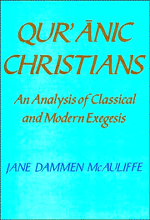Book contents
- Frontmatter
- Contents
- Acknowledgments
- Abbreviations
- Introduction
- PART I QURʾĀNIC COMMENTARY AND COMMENTATORS
- PART II QURʾĀNIC COMMENDATION OF CHRISTIANS
- 3 Nazarenes of faith and action
- 4 Followers of the Qurʾānic Jesus
- 5 Steadfast and submissive
- 6 The promised bounty of piety
- 7 The praiseworthy amity of Christians
- 8 Christians as pre-Qurʾānic Muslims
- 9 Compassion, mercy, and monasticism
- Conclusion
- Works cited
- Index of Qurʾānic verses
- Index of names and subjects
8 - Christians as pre-Qurʾānic Muslims
Published online by Cambridge University Press: 24 February 2010
- Frontmatter
- Contents
- Acknowledgments
- Abbreviations
- Introduction
- PART I QURʾĀNIC COMMENTARY AND COMMENTATORS
- PART II QURʾĀNIC COMMENDATION OF CHRISTIANS
- 3 Nazarenes of faith and action
- 4 Followers of the Qurʾānic Jesus
- 5 Steadfast and submissive
- 6 The promised bounty of piety
- 7 The praiseworthy amity of Christians
- 8 Christians as pre-Qurʾānic Muslims
- 9 Compassion, mercy, and monasticism
- Conclusion
- Works cited
- Index of Qurʾānic verses
- Index of names and subjects
Summary
The verse group that will be the subject of this chapter is perhaps the most allusive of those examined. There is no specific reference to the Christians either by name or designating phrase. Rather the clues to its import for the subject of this study must be sought in the exegetical tradition itself. From within the cluster of questions that confront the commentators as they address these verses there emerges a hermeneutical consensus, an orientation of meaning inclusive of Christians. The four consecutive verses to be discussed are from sūrat al-qaṣaṣ (28):52–55:
Those to whom We gave the book before it/him believe in it/him. (52)
And when it was recited to them they said, “We believe in it/him. Certainly it is the truth from our Lord; truly we were Muslims before it.” (53)
These will be given their reward twice because of that in which they have persisted. They turn back evil with good. From what We have given them, they spend. (54)
When they hear idle chatter, they turn away from it and say, “To us, our deeds and to you, your deeds. Peace be upon you; we do not desire ignorant people.” (55)
THE PROBLEM OF PRONOUNS
Matters of pronominal identification are of immediate concern, as even an English translation of these verses makes readily apparent. Verse 28:52 contains five uses of the pronoun -hu here translated first as it, as well as an implied pronominal subject for the verb recited.
- Type
- Chapter
- Information
- Qur'anic ChristiansAn Analysis of Classical and Modern Exegesis, pp. 240 - 259Publisher: Cambridge University PressPrint publication year: 1991
- 1
- Cited by



